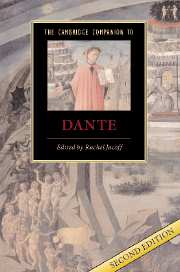Book contents
- Frontmatter
- 1 Life of Dante
- 2 Dante and the lyric past
- 3 Approaching the Vita nuova
- 4 From auctor to author: Dante before the Commedia
- 5 Introduction to Inferno
- 6 Introduction to Purgatorio
- 7 Introduction to Paradiso
- 8 Dante and the Bible
- 9 Dante and the classical poets
- 10 Allegory and autobiography
- 11 A poetics of chaos and harmony
- 12 The theology of the Comedy
- 13 The poetry and poetics of the creation
- 14 Dante and Florence
- 15 Dante and the empire
- 16 Dante and his commentators
- 17 Dante in English
- Further reading
- Index
- Series List
15 - Dante and the empire
Published online by Cambridge University Press: 28 May 2007
- Frontmatter
- 1 Life of Dante
- 2 Dante and the lyric past
- 3 Approaching the Vita nuova
- 4 From auctor to author: Dante before the Commedia
- 5 Introduction to Inferno
- 6 Introduction to Purgatorio
- 7 Introduction to Paradiso
- 8 Dante and the Bible
- 9 Dante and the classical poets
- 10 Allegory and autobiography
- 11 A poetics of chaos and harmony
- 12 The theology of the Comedy
- 13 The poetry and poetics of the creation
- 14 Dante and Florence
- 15 Dante and the empire
- 16 Dante and his commentators
- 17 Dante in English
- Further reading
- Index
- Series List
Summary
In his brilliant little book Dante as a Political Thinker, published more than fifty years ago but arguably still the most stimulating introduction to the subject in English, my old teacher Alessandro Passerin d'Entrèves assigns to Dante's theory of the empire only a limited place. D'Entrèves emphasizes Dante's preoccupation with his Florentine “patria” and the church, as well as his cultural patriotism, while denying his political nationalism. Dante was therefore, in the tradition of his family, essentially a loyal “Guelf,” even if a troubled one as the Commedia shows (a work begun, d'Entrèves believes, after the collapse in 1313 of Emperor Henry VII's Italian expedition). Dante's “Ghibellinism,” his advocacy of the imperial cause, was an important but passing phase in the evolution of his thought. His treatise on the empire, Monarchia, which d'Entrèves dates as c. 1312, was an aberration, indicating how he had been overcome by the hope that a human saviour could take away the sins of the world, forgetting the fundamental Christian idea that from within, and not from without, must mankind be redeemed and saved. D'Entrèves believes that the Commedia was written after the Monarchia and marks a return to a more orthodox view of salvation. In my view, both works reveal the central importance to Dante of the empire. There is ample evidence also in Dante's vernacular encyclopedia, the Convivio, that he believed men must be saved not only from within but also from without, and that the emperor is the essential agent for this task. Even if d'Entrèves's dating of Monarchia and the Commedia is correct, they seem to reveal no important change in Dante's convictions about the nature, purpose, and importance of the empire.
- Type
- Chapter
- Information
- The Cambridge Companion to Dante , pp. 257 - 269Publisher: Cambridge University PressPrint publication year: 2007
- 6
- Cited by

